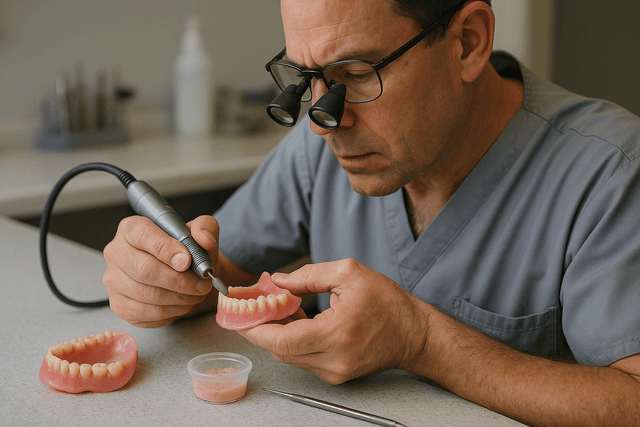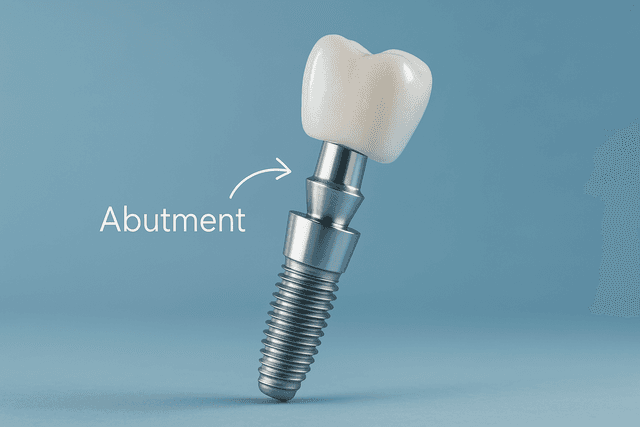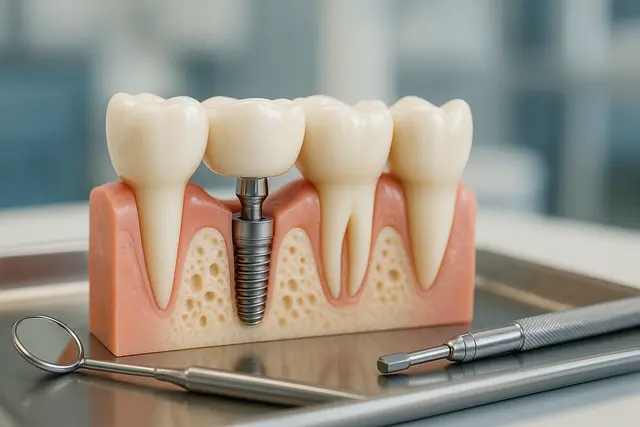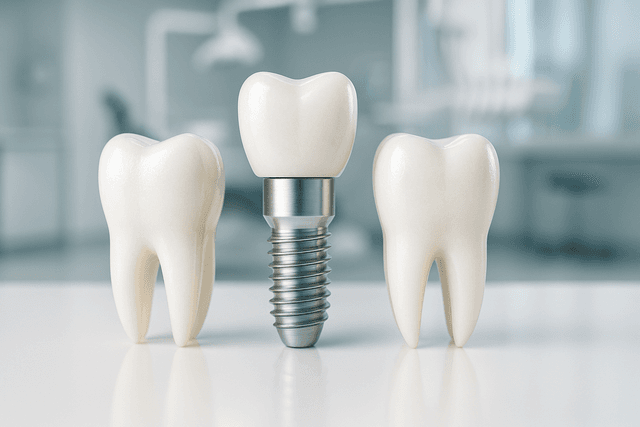Prosthodontics
6 min read
May 23, 2025
When to Get Denture Adjustments and Repairs (And Why It Matters)
Wearing dentures should make life easier, not more frustrating. But over time, even the best-fitting set can start to feel off. Maybe your bite feels uneven, or your dentures are slipping when you talk. These little annoyances aren’t just uncomfortable, they could be signs it’s time for denture adjustments and repairs.

If you wear dentures, you know the goal is simple: eat, speak, and smile with confidence. But even the best-made dentures aren’t a one-and-done deal. Like any well-used tool, they’ll need a tune-up here and there. Whether it's a small tweak or a full-on denture repair, knowing when to act can save you from major discomfort, and from an embarrassing slip during dinner.
Dentures That Fit Right Make All the Difference
When dentures fit properly, they feel almost like natural teeth. You can chew your food without a second thought, smile without worry, and talk without adjusting your speech. But let’s be real: your mouth changes over time. The contours of the mouth shift, gums recede, and bone density can decrease. What fit snugly a year ago may now wobble like a loose tile.
This is where a denture adjustment can work wonders. If you’re biting into a sandwich and suddenly feel pressure where you shouldn’t, or if your dentures are rubbing your gums raw, don’t push through the pain. Those are classic signs you may need one or more adjustments. Left alone, small issues can snowball into bigger problems, not to mention throw off your entire oral health routine.
The Truth About Denture Adjustments and Repairs
Dentures are durable, sure, but they’re not invincible. Dropping the dentures on the bathroom floor (it happens more than you think) or biting down too hard on a popcorn kernel can lead to cracks or chips. Some folks try to fix dentures at home with super glue or over-the-counter denture repair kits. Please don’t. This is not the time for DIY.
Proper denture adjustments and repairs are available through your dental office. A trained dentist can adjust the dentures to ensure they fit properly, fix surface issues, or even reshape part of the denture to match changes in your mouth. These adjustments and repairs can help patients avoid pain, prevent infection, and extend the life of their dentures.
What Counts as a Denture Repair?
Let’s break it down. Common denture repairs include fixing cracks, chips, or breaks in the base or the replacement teeth. If your dentures are loose or suddenly start clicking when you speak, you might need a denture reline, a process where the underside of your denture is reshaped to better match your gums.
There’s also a difference between a minor fix and a major repair or replacement. A small chip in one of the teeth might be handled the same day, while a full break in the base could mean crafting a whole new set. Either way, repairs will help keep your dentures in good condition and make them more comfortable for daily use.
When Do Dentures Need a Reline?
If your dentures feel off, but they’re not broken, a denture reline might be the answer. Relines involve reshaping the side that sits against your gums. This helps if your gums have shrunk or shifted, which happens naturally over time, especially after receiving dentures or following tooth extraction.
Think of relines as fine-tuning. They don’t change the appearance of your dentures, just the way they fit. If your dentures should sit flush but now rock slightly, or if you’re using more adhesive than usual, it might be time to ask your dentist for a reline.
Signs You Need a Denture Repair or Adjustment
You shouldn’t have to wonder when your dentures need help. There are some telltale signs that a denture adjustment or repair may be necessary:
Soreness in your gums or jaw
Dentures crack or have visible damage
Difficulty chewing or speaking clearly
Your dentures are loose or fall out unexpectedly
You’re avoiding your favorite foods
Pressure points or recurring sores in the mouth
Don’t wait for the discomfort to go away on its own. Dentures will occasionally need to be repaired or adjusted, and early fixes are almost always simpler, and cheaper, than waiting until there’s a major problem.
How a Dentist Can Help
Seeing a dentist for denture adjustments is an effective way to avoid adjustments or repairs down the line. Your dentist may notice issues that haven’t shown up yet, such as stress points that could lead to a crack. At regular dental appointments, your provider can also clean and polish your dentures professionally, keeping them in good condition and making them feel fresh.
In fact, the American Dental Association and the College of Dental Hygienists of Ontario both recommend routine checkups to ensure optimal denture function and overall oral health. Adjustments and repairs will help maintain a strong, comfortable bite, reduce gum irritation, and protect against long-term damage.
Avoiding Denture Damage (As Much As Possible)
The best way to avoid frequent denture adjustments and repairs is to treat your dentures like a valuable tool, because they are. That means following instructions for care, never sleeping with them in, and storing them in water or a safe, clean container when not in use.
And please, no boiling water. It won’t disinfect your dentures, it’ll just warp them. And while it’s tempting to fix minor cracks with glue or home kits, the safest bet is always to schedule an appointment with a dentist who can accurately fix dentures and check for deeper problems.
Questions About Denture Fit and Function
If something feels off, trust your gut. Whether it’s a nagging sore spot, a clicking noise when you talk, or a set that just doesn’t feel right anymore, these can all signal that you need a denture repair or adjustment. And if you're new to dentures, ask your dentist what to expect in terms of wear, fit, and maintenance. Knowing what’s normal, and what’s not will help you spot problems before they become headaches.
Not sure if what you're feeling is normal? See our dentist. One quick look can tell us if you need a denture adjustment, reline, or full repair. The benefits of denture adjustments go far beyond comfort, they help patients eat better, speak clearly, and feel like themselves again.
Denture Care Tips That Actually Work
Most people don’t love cleaning their dentures, but proper denture care is one of the easiest ways to make sure they stay in good shape. Use a soft brush (not your regular toothbrush), avoid abrasive cleaners, and never skip your daily rinse.
Dentures can be professionally polished during dental visits to remove plaque and keep them looking their best. Keeping your dentures clean protects your oral health and extends the life of the dentures themselves.
Time to Schedule an Appointment?
If any of this sounds familiar, it might be time to set up an appointment. Whether you need a quick adjustment or a full denture repair, our team is here to help you enjoy comfortable dentures that fit your lifestyle. Remember, repairs is to follow care, not replace it, but even the most cautious denture wearer can run into trouble now and then.
Have questions about denture care, fit, or repairs? Schedule your dental exam and learn what options are available. We’ll explain the denture adjustment process, look for signs of wear, and help you avoid sub-optimal oral care that can lead to bigger issues down the road.
Denture needs change, and your dental care should change with them. Whether you wear full dentures, partial dentures, or have a dental implant, regular checkups and timely adjustments or repairs will keep your smile working as hard as you do.
It’s your smile, after all. Let’s keep it strong.
How Do I Know If My Dentures Need an Adjustment or Repair?
If your dentures feel loose, cause sore spots, make clicking sounds while speaking, or you’re avoiding certain foods, they likely need an adjustment or repair. Even small issues can turn into bigger problems if not addressed early.
What’s the Difference Between a Denture Adjustment and a Denture Repair?
An adjustment typically involves reshaping or fine-tuning the denture for better fit and comfort, while a repair fixes cracks, chips, or breaks. Both are essential for maintaining comfort and extending the life of your dentures.
When Should I Consider a Denture Reline?
You may need a reline if your dentures still look fine but no longer fit properly. A reline reshapes the inner surface of your dentures to better match your gums, especially if you’ve experienced gum shrinkage or recent tooth extractions.
Can I Fix My Dentures at Home?
It’s not recommended. Using glue or DIY kits can damage your dentures and may cause further issues. Always see a dental professional for safe, effective adjustments and repairs that keep your dentures, and your mouth, in top shape.
Read Next
Related Posts

Prosthodontics
Implant Abutment Explained: What It Is and Why It Matters
Dental implants have revolutionized the way we restore missing teeth, but there's more to them than just the visible crown. One often-overlooked component, the implant abutment, plays a crucial role in both the function and appearance of the final result. Understanding what it is and why it matters can make all the difference in your implant journey.
4 min read
Oct 10, 2025

Prosthodontics
Pros and Cons of Implant Retained Bridges: A Simple, Honest Overview
Missing teeth can affect more than just your smile, they can impact your confidence, speech, and even how you eat. With so many options out there, it’s easy to feel lost in dental jargon and marketing buzzwords. That’s why we’re breaking down implant retained bridges in plain English, highlighting the pros and cons so you can make an informed choice without the fluff.
6 min read
Oct 10, 2025

Prosthodontics
Implant Crown Lifespan: What to Expect
Getting a dental implant crown is a big step toward restoring both function and confidence in your smile. But like any dental work, it's natural to wonder how long it will actually hold up. From materials and maintenance to daily habits, several factors play a role in how long your implant crown will last.
4 min read
Oct 10, 2025
Don’t have time to research every dentist around you?
See why 30k+ patients trusted us